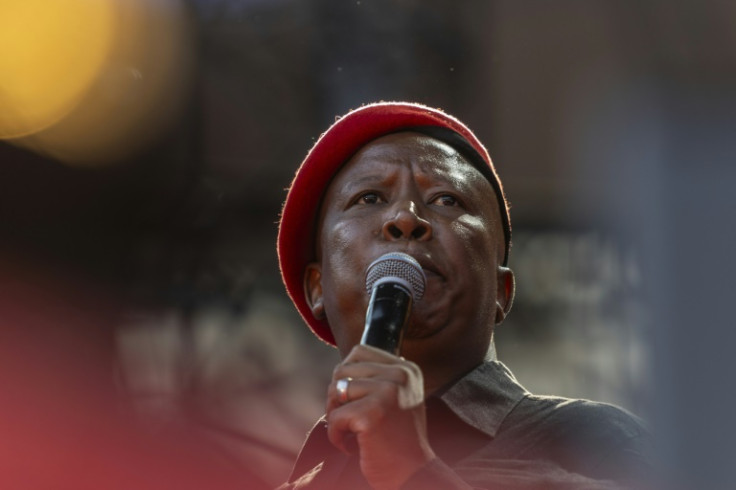Buoyed By Polls, S.Africa's Radical Left Party Launches Election Campaign

Rising in the polls and vying to become South Africa's leading opposition party, the radical leftist Economic Freedom Fighters (EFF) will launch its electoral campaign on Saturday ahead of a hotly contested vote.
Julius Malema, the party's firebrand leader, is expected to unveil its manifesto at a stadium seating about 55,000 people in the country's third-largest city of Durban.
Renowned for its theatrics, the EFF has gained prominence advocating for radical reforms including land redistribution and the nationalisation of key economic sectors to tackle deep inequalities that persist in the country more than three decades after the end of apartheid.
"Malema is popular because he has risen up as a person who openly challenges authority head on for failing to liberate black people," independent political analyst Sandile Swana told AFP.
The choice of Durban to launch the campaign is significant as the port city is located in the eastern KwaZulu-Natal province, South Africa's second most populous and a key electoral battleground.
The ruling African National Congress (ANC) is set to launch its own manifesto at the same venue in two weeks.
Malema, 42, founded the EFF in 2013, after he was thrown out of the ANC, where he served as youth leader, for fomenting divisions and bringing the party into disrepute.
The party took third place in the 2019 general elections with 10.8 percent of the vote, securing 44 parliamentary seats.
Support has since grown, largely among young, black South Africans angered by widespread poverty and unemployment.
Actively targeting universities and young voters, the militant party has won a string of student body votes in recent years, enlisting celebrities and influencers to spread its message.
"The EFF has formed an identity as a party of young intellectuals and thinkers who champion formal education for black people" Swana said.
Some polls show that it is currently battling with the liberal Democratic Alliance (DA) for second place behind the ANC.
A recent Ipsos survey put the two parties tied at between 17 and 20 percent.
The DA, which in recent years has struggled to stave off its white, middle-class identity and win over black voters, has formed a coalition with several other groups in the hope of unseating the ANC.
But it has refused to join forces with the EFF, citing stark differences.
The EFF and its outspoken, populist leader enjoy major coverage in local media, helped by controversial statements and stunts such as vocal protests or turning up in parliament in overalls, hardhats, and gumboots.
In power since the advent of democracy in 1994, the ANC risks losing its parliamentary majority for the first time, its reputation tainted by graft and mismanagement.
Polls show it could win as little as 40 percent of the vote -- something that would force it to seek a coalition government to stay in power.
The vote is to be held on a date between May and August.
© Copyright AFP 2024. All rights reserved.











